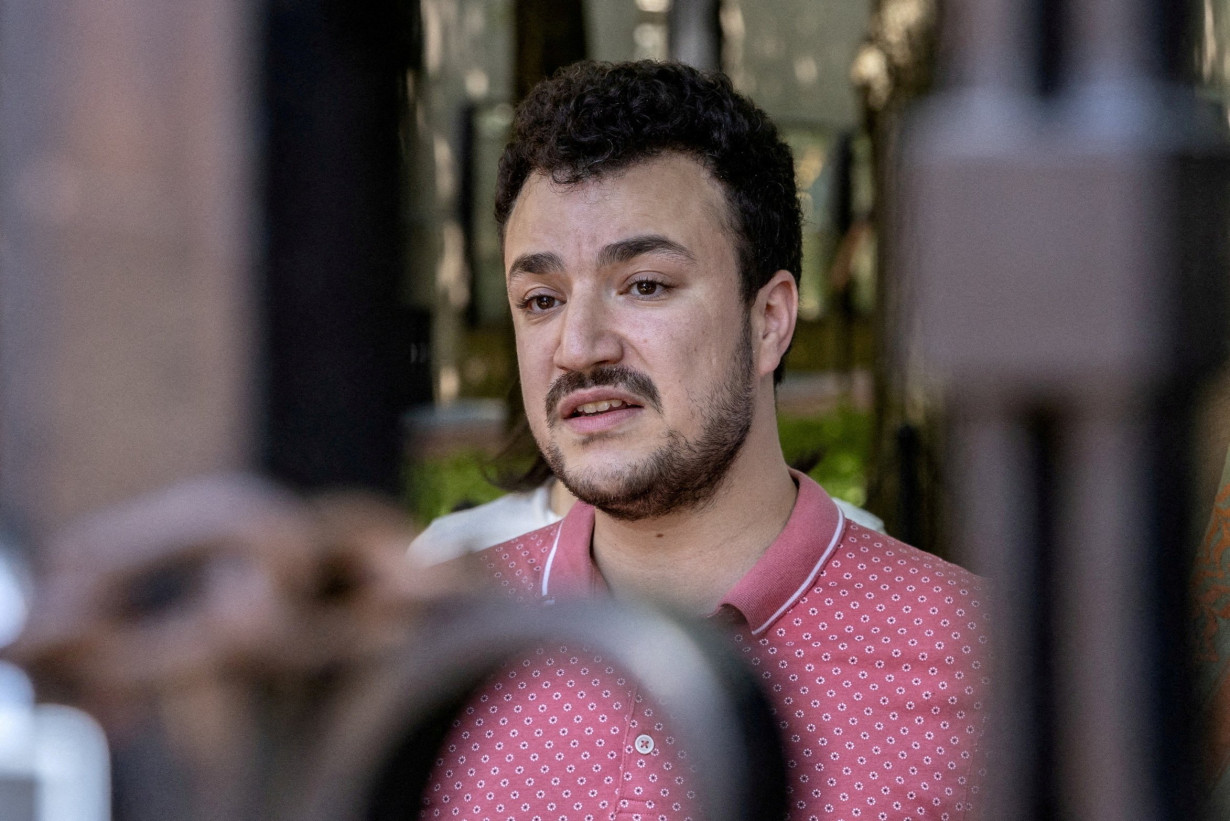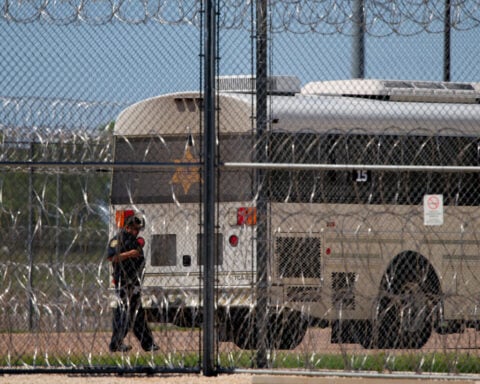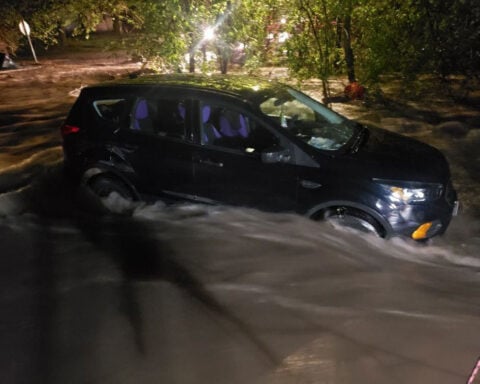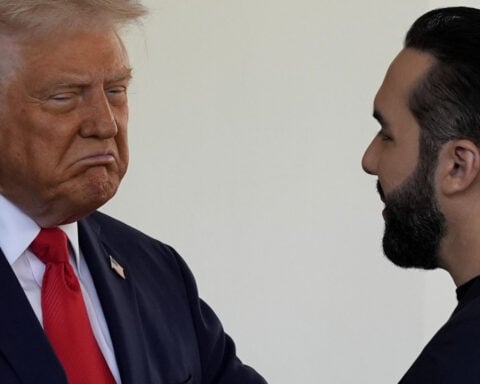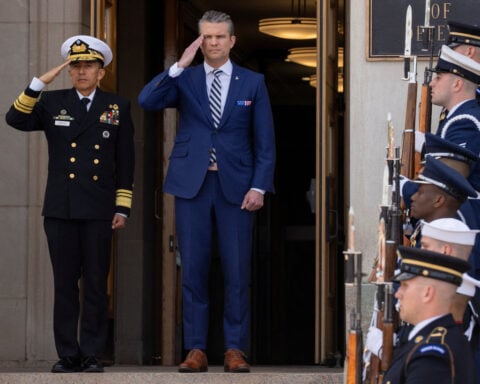By Jonathan Allen and Luc Cohen
JENA, Louisiana (Reuters) -An immigration judge on Tuesday gave the U.S. government a day to show evidence that Columbia University student Mahmoud Khalil should be deported and said she would rule on the case on Friday, a month after his arrest in New York and transfer to a rural Louisiana jail 1,200 miles (1,931.21 km) away.
"If he's not removable, I'm going to be terminating this case on Friday," Assistant Chief Immigration Judge Jamee Comans said during a hearing at the LaSalle Immigration Court in Jena, Louisiana.
If the government's deportation case is terminated at the hearing scheduled for Friday afternoon, Khalil, 30, is free under immigration law. The government cannot challenge the termination, but if the judge terminates the case without prejudice it can attempt to file the removal case again.
Khalil sat at a table in the courtroom, wrapping prayer beads around his right hand as he listened to his attorney Marc Van Der Hout appear remotely from California on a nearby screen to tell the court he had not received a single document of the government's evidence.
"There's nothing more important to this court than Mr. Khalil's due process rights," Comans told Van Der Hout after he asked for more time to review the government's evidence. "I'm also not going to keep Mr. Khalil detained while attorneys go back and forth about documents."
Department of Homeland Security lawyers told Comans they would provide the evidence by her 5 p.m. Wednesday deadline.
In a statement later, Khalil's attorney Van Der Hout said he was concerned the judge would rule without giving the defense time to respond to the government's case, a concern he had raised earlier in court.
"What this case is really about is whether lawful permanent residents — and other immigrants to this country — can speak out about what is happening in Gaza, or any other important matters of discussion in the national discourse without fear of deportation for expressing beliefs that are completely protected by the First Amendment," Van Der Hout said. "Are U.S. citizens going to be next?"
The First Amendment of the U.S. Constitution guarantees the right to free speech and assembly.
President Donald Trump's administration says it has revoked Khalil's status as a lawful permanent resident under a 1952 law allowing the deportation of any immigrant whose presence in the country the secretary of state deems harmful to U.S. foreign policy.
The U.S. government also has said the pro-Palestinian demonstrator should be forced out from the country because he withheld information from his application for a green card, which he has denied.
During Tuesday's hearing, Comans read the government's allegations, and Van Der Hout responded with "deny" to each.
The immigration case is separate from a challenge to the legality of his March arrest, known as a habeas corpus petition.
A U.S. district judge hearing Khalil's habeas petition has ruled that he must remain in the U.S. for now while he considers Khalil's petition to either free him or move him to New Jersey.
If Comans rules on Friday that Khalil can be deported, he would then be able to ask her to rule on whether he is eligible for "relief from removal," which can be granted in limited cases, including a fear of persecution in the immigrant's home country. Khalil can also appeal her rulings.
Since Khalil's arrest Secretary of State Marco Rubio has said he has revoked the visas of hundreds of foreign students. The Trump administration says college protests against U.S. military support for Israel have included harassment of Jewish students.
Student protest organizers, including some Jewish groups, say criticism of Israel is being wrongly conflated with antisemitism.
Khalil, a Palestinian born in a refugee camp in Syria, has called himself a political prisoner. His lawyers have argued the Trump administration improperly targeted him for his political views in violation of his right to free speech guaranteed by the U.S. Constitution's First Amendment.
Khalil's wife, Noor Abdalla, is a U.S. citizen, and due to give birth to their first child this month. She has not been able to travel to Louisiana to visit him due to her pregnancy.
The hearing had been delayed nearly a half hour because the judge could not find some of Khalil's lawyers among what she said was nearly 600 people trying to access the video feed, evidence of the high interest in the case.
The judge allowed in only lawyers and, at Khalil's request, his wife.
(Reporting by Jonathan Allen in Jena, Louisiana, and Luc Cohen in New York; editing by Donna Bryson, Nick Zieminski, Alistair Bell, Deepa Babington and Richard Chang)

 Trump has begun another trade war. Here's a timeline of how we got here
Trump has begun another trade war. Here's a timeline of how we got here
 Canada's leader laments lost friendship with US in town that sheltered stranded Americans after 9/11
Canada's leader laments lost friendship with US in town that sheltered stranded Americans after 9/11
 Chinese EV giant BYD's fourth-quarter profit leaps 73%
Chinese EV giant BYD's fourth-quarter profit leaps 73%
 You're an American in another land? Prepare to talk about the why and how of Trump 2.0
You're an American in another land? Prepare to talk about the why and how of Trump 2.0
 Chalk talk: Star power, top teams and No. 5 seeds headline the women's March Madness Sweet 16
Chalk talk: Star power, top teams and No. 5 seeds headline the women's March Madness Sweet 16
 Purdue returns to Sweet 16 with 76-62 win over McNeese in March Madness
Purdue returns to Sweet 16 with 76-62 win over McNeese in March Madness
